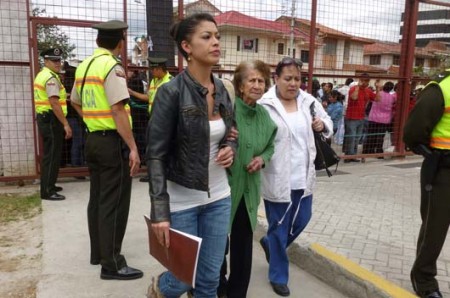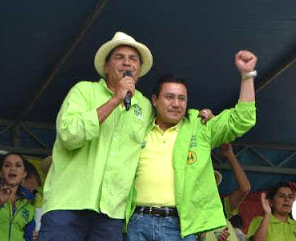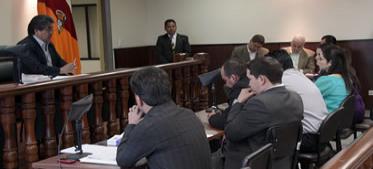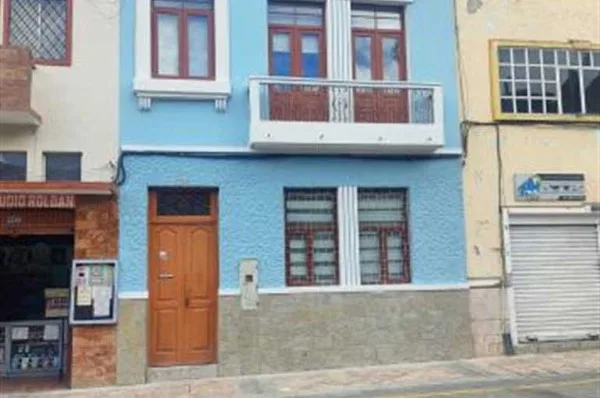Coopera shutdown: the arrests; all systems are normal and then they’re not; the risks; government secrecy
Editor’s note: This is the second of a two-part series about the collapse of Cuenca financial cooperative Coopera, and the aftermath.
By David Morrill

Coopera members gather outside a branch office in Cuenca following the 2013 collapse.
Coopera’s troubles went public on June 6, when police arrested chief financial officer Aldo Santiago Calle and auditor Raúl Efraín Carpio. Five days later, on June 11, general manager Rodrigo Aucay was arrested in Quito after he returned from a trip to the Dominican Republic. Initially, the three were charged with money laundering, but in mid- September, the charges were expanded to include embezzlement.
On Monday, June 10, following the arrests, SEPS issued a statement assuring investors that all systems were normal at Coopera. According to SEPS communications director Isabel Iturralde, the arrests were isolated cases and did not indicate financial troubles. “The investigation focuses solely on the employees who have been identified and arrested. The functions of Coopera have not been compromised and all services will continue as before,” Iturralde said.
Two days later, on June 12, SEPS reversed course and ordered Coopera shut down. The agency provided little information about the sudden change other than to cite an unexpected run on the bank and inconsistencies in bookkeeping. The move left account holders stunned.
Within days of the closure, SEPS announced that 99% of Coopera members would be repaid or have access to their money through four other area cooperatives assigned to take over Coopera accounts.
“When we heard this, we were relieved,” says expat Patricia LaPlaca. “We assumed that the 1% of account holders were the ones involved in the embezzlement and money laundering.”
A week later, however, SEPS announced a reimbursement formula that favored small account holders at the possible expense of larger ones. It was the first indication that Coopera members with larger accounts might be left out in the cold. Legal representatives for some members say that the formula was an about-face from a proportional repayment plan laid out earlier in SEPS internal documents.
On June 14, two days after the closing, a group of coop members and their legal representatives met with Cristian Cruz, SEPS technical manager and other SEPS officials to discuss the possibility of coop members taking control of Coopera, or at least its markets and restaurants, in an effort to protect their investments. At the meeting, Cruz said he was open to the idea but it was soon off the table and not discussed again.

President Rafael Correa with Coopera general manager Rodrigo Aucay during Aucay’s campaign for the National Assembly.
According to Coopera member and attorney Carlos Heredia, it is normal procedure in financial cooperative failures to allow members a chance to fix problems. “We should have been given time to make corrections,” he said. “They refused to give us the opportunity. They violated their own policy.”
Coopera members discovered later that, at the time of the June 14 meeting, SEPS had already sold the institution’s loan portfolio, meaning that the coop was effectively out of business at the time of the meeting.
More confusion arose about the amount of Coopera losses. SEPS director Hugo Jácome reported to Ecuador’s National Assembly in July that there was a $2.2 million short-fall. A week later a figure $12 million figure was provided by a SEPS spokesman. On August 21, however, Diego Aguilar, the SEPS liquidator, said losses were $50 million although he changed the figure to $26 million a few days later.
In comments during his weekly television broadcast, September 28, President Rafael Correa seemed to back Aguilar’s comments, saying that $50 million in assets were “compromised,” with loses as much as half that amount.
Too Good to be True?
Even before Coopera’s downfall, many of those who opened accounts there had heard the warnings. The fact that the coop was not insured by the federal banking insurance program was one red flag, they were told. Another concerned the sustainability of high interest rates.
Following the Coopera closure, the criticism, much of it from friends and family of investors, took on an ‘I-told-you-so’ tone.
“I swear that some of the same people who told me to open an account with Coopera two years ago are now telling me that I was paying the price for making a risky investment,” Canadian Roger Johnston says. “Obviously, I feel bad enough without people piling on.”
LaPlaca has encountered similar judgments. “We’ve heard a lot of the ‘if-it sounds-too-good-to-be-true-it-probably-is’ talk and, of course, it’s easy to say that in retrospect,” she says. “On the other hand, it wasn’t the interest rates that brought down Coopera. It was the criminals at the top who betrayed us.”
LaPlaca adds: “My husband and I did our research before we invested. Everything we learned told us that Coopera was financially strong and we found nothing that indicated that the management was dishonest.”
Coopera member Elisa Vallejo maintains that there was nothing risky with the Coopera model, and no reason it could not have been successful were it not for the criminal activity. “The model was caring about people and I believe it would have continued to work,” she says. She adds that high inerest rates were a by-product of the model.
SEPS: Incompetence, corruption or just growing pains?
Although Vallejo, LaPlaca, Heredia, and other Coopera members put most of the blame for the shutdown on Coopera management, they are also angry at the government for what they consider, at best, bungled and uncaring administration of the closure and, at worst, unethical and possibly illegal activity. The worst part, they say, is the secrecy that surrounds the closing, particularly the lack of a clear reason why Coopera was closed in the first place.
Whether SEPS is incompetent or corrupt is beside the point to many investors. “The whole process stinks,” says Johnston. “The secrecy, the way they decided to pay people back, nothing makes sense. All I know is that I’m out a lot of money and want to get it back.”
Hector Fajardo, president of the Association of Financial Cooperatives in Southern Ecuador, agrees that there was a break-down in SEPS’s handling of the process. “There was a lack of communication and I don’t know the reasons why. The coop members needed to be involved in the process and they weren’t allowed to be.” He adds the bigger problem may be the fact that the government did not recognize the problems at Coopera sooner.
But Fajardo also says that Coopera members had an obligation to keep their own house in order. “Ultimately, it is up the members to make sure the cooperative is being managed properly, to ask for transparency in accounting and policy. Yes, the government has an obligation of oversight, but the members are closer to the day-to-day operation than the government and have a personal stake in making sure things are working properly.”
Fajardo says there may be a limit to the amount of blame SEPS deserves. “SEPS has existed for less than a year. It’s a new agency and Coopera is the first big case it has handled.” SEPS is an agency within the Ministerio Inclusión Económica Social Ecuador, or MEIS, which was responsible for monitoring the financial cooperatives until early 2013, Fajardo says. “If there was a problem with oversight before this year, it is the responsibility of MEIS.”
The Pay-outs
Beginning July 1, SEPS ordered two phases of repayments to small account holders, the first for those with $10,000 or less, the second for amounts up to $30,000. In some special-needs cases, refunds were made up to $40,000.
“Under their formula, if you had less than $30,000 in your account you got everything back,” said Heredia. “But if you had five cents more than $30,000, you received nothing. It was simply not logical. It was also not fair.”
Although all parties expect a third phase of payouts, there is no indication of the amounts that will be paid back or when it might occur. SEPS officials say they have to complete the liquidation process before they can provide specifics. President Correa is on record as saying that unpaid coop members should not expect to get all of their money back. “Like everything else in this case, we are left in the dark,” says Heredia.
Strategy and Anger
In the aftermath of Coopera’s closing, especially when information was not forthcoming, numerous strategy meetings were held among members as well as meetings with Cuenca mayor Paúl Grande and Azuay Province Prefect Paúl Carrasco. There were protests in Parque Calderon and even talk of hunger strikes. Some expat investors blogged and Tweeted that they would conduct a smear campaign against Cuenca and Ecuador if they didn’t get their money back.
“There’s an enormous amount of anger from both the expats and Cuenacanos,” says LaPlaca. “The fact the government has not followed its own rules in the closure and liquidation is inexcusable.”
Besides hard times for Coopera members who have lost access to the principal and income of their accounts, the immigration status of some North American investors has been put in limbo.
One of those is Robert Brenner. “I planned to use my deposit as the basis for my residency visa. But because of what’s happened, they went back on their word and denied me my visa.” Brenner is fighting the denial in court, with Heredia as his attorney.
“I was working in good faith and did everything the immigration office asked and now, due to no fault of my own, I get screwed.”
Looking Forward
Efforts by unpaid Coopera members to recoup their money and pursue justice continue on several fronts.
Gustavo Quito, one of the legal representatives for coop members, hopes to recover money from the jailed management officials. “If they used Coopera money to buy personal property, we want that money back to repay account holders.” Like Heredia, he also wants to make sure that the guilty parties serve lengthy prison terms.
Both Heredia and Quito want to see a thorough investigation of SEPS’s handling of the closure. They also want full disclosure about what MEIS knew about Coopera’s financial troubles dating to 2010 and why members were not informed.
Some coop members, especially expats, continue to press efforts to return food markets and restaurants to members. Others, however, say that those facilities have suffered too much bad publicity to recover and are a lost cause.
Without financial information and participation in the liquidation process, Heredia says coop members are forced to play a painful waiting game. “This is the worst part of it for all of us,” he says. “All we want is to know the facts and to participate in decision-making. We are the owners of Coopera, after all.”
Heredia and LaPlaca still believe unpaid members may eventually be repaid in full, but some of the earlier optimism has been tempered by Correa’s apparent support for the government process. “Our hope is that once SEPS finishes its work, other agencies of the government will take a look and see what really happened and clean up the mess.” In the meantime, LaPlaca says, it’s essential that Coopera member remain united.
Heredia remains optimistic that higher courts will reverse the lower-court decisions and release information about why Coopera was closed, as well as other details that might help unpaid investors. “There were constitutional violations here that need to be addressed.”
He adds that it is important that the unpaid Coopera members take the long view. “Nothing will be resolved quickly. We need to stay focused and continue the fight to the conclusion.”




















